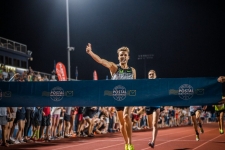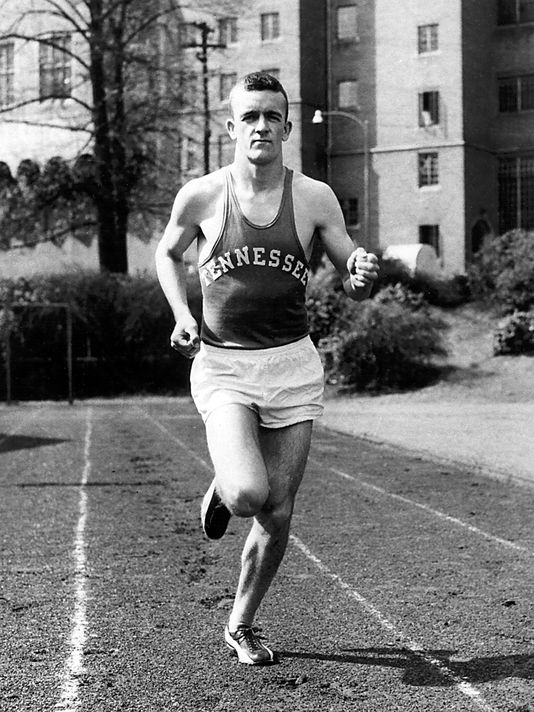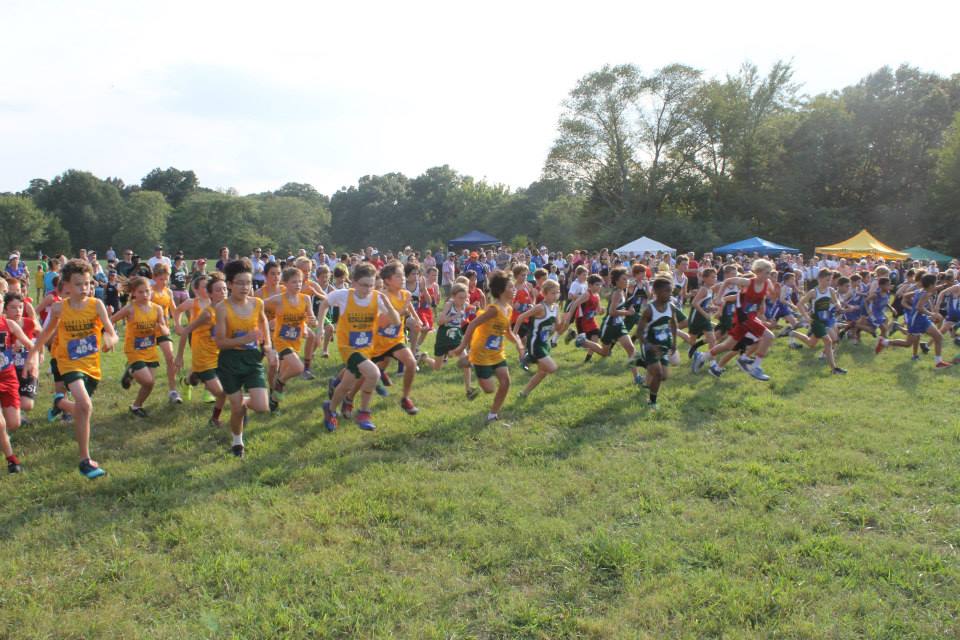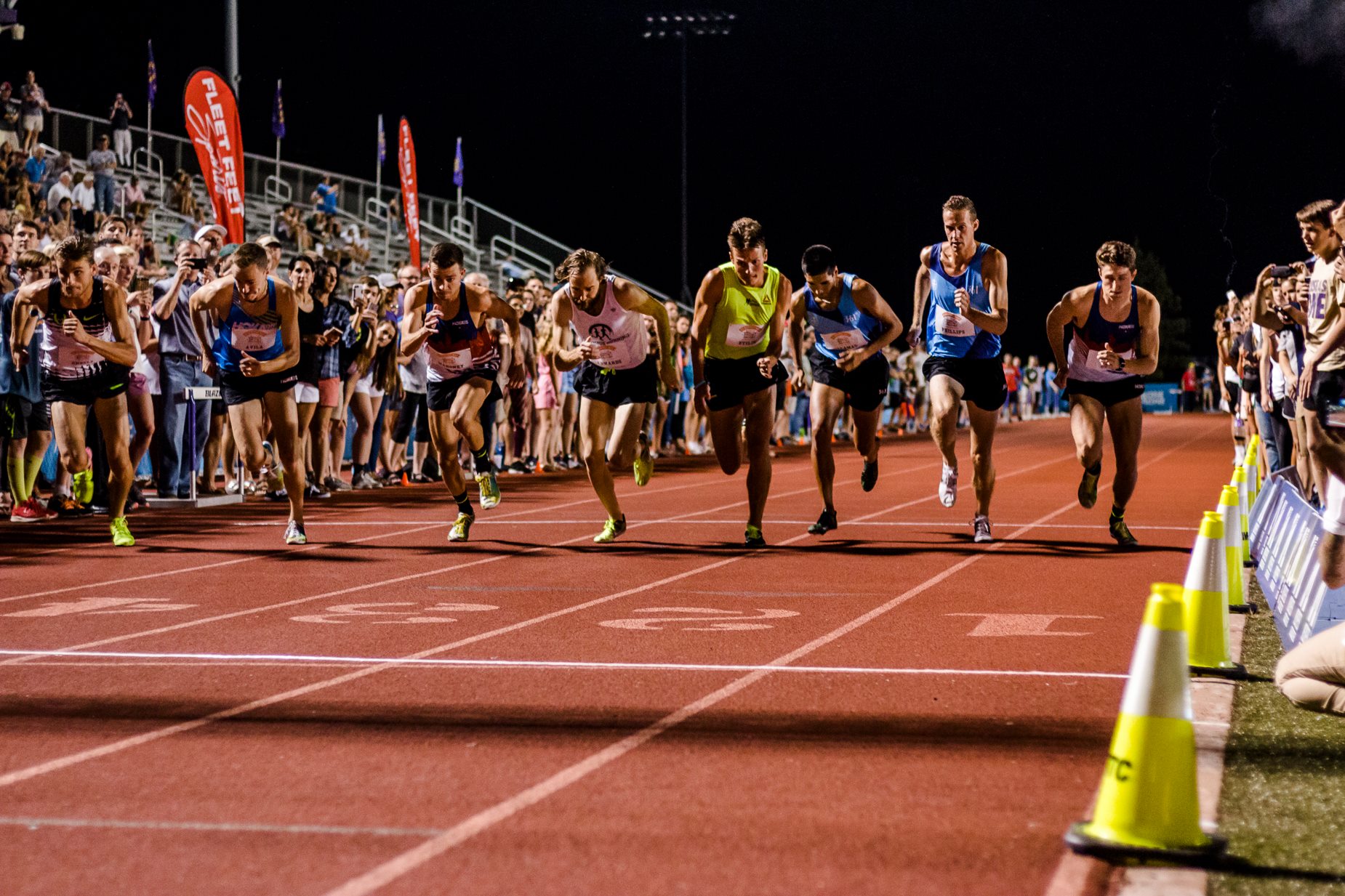Making the Most of Your Mile: Ed Murphey Memphis Mile

Inaugural Ed Murphey Mile sees first sub-4 minute Mile on Memphis soil; rising star Craig Engels clocks winning 3:58.35; event boasted $10,000 overall prize purse
By David Monico, Bring Back the Mile
Christian Brothers High School Cross Country and Track & Field coach, Nick Dwyer doesn’t seem like the type of guy who enjoys sleeping much. More importantly he is passionate about providing opportunities for all to participate, while growing the sport from elementary schools on up. In addition to his coaching duties at Brothers, he also serves as head of the Memphis Youth Athletics where more than 1,500 kids participate in Cross Country and Track & Field with 60-plus schools participating from the tri-state area of Tennessee, Arkansas and Mississippi.
This community foundation led to becoming a flagship HOKA ONE ONE Postal Nationals event, a 2-Mile High School track race during the cross country season, with events around the country. However, Nick also had his eyes on elevating the event with a marquee Mile professional race to inspire the youth participating. Within just a few weeks, they had named the event after Tennessee legend, Ed Murphey, and raised more than $10,000 to facilitate athlete travel as well as the prize purse.
On Saturday night, August 26, their efforts culminated in an event worthy of Friday night high school football excitement. NIKE’s Craig Engels took the win in 3:58.35, Memphis’ first sub-4 ever, while two others also broke the coveted standard: HOKA’s Eric Avila (3:58.92) and Travis Mahoney (3:59.42). In the women’s metric Mile, Canadian Kate Van Buskirk finished first in 4:07.48.
We sat down with Nick before the event to discuss how the Mile “magic” and more all came together in Memphis.
BBTM: Why do people need to know about Ed Murphey?

He's someone who is held in very high regard in the local running community. He would always come and help you; he'd always give you advice and he always had a smile on his face. He unfortunately left us in 2014, but he left a pretty significant legacy, just not only in the Memphis area, but also at the University of Tennessee where they have the Ed Murphey Award. There's an extensive list of track athletes who have won including Willie Gault, Anthony Famigletti, Aries Merritt and Christian Coleman.
When you think about some of the major hubs out there, obviously you have Eugene as well as places like Des Moines and Mt. SAC in California, etc. But, not only has the University of Tennessee produced a lot of incredible middle and long distance athletes as well as others, but there just seems to be a really great running culture in Tennessee and in Memphis. What drives that?
I think Memphis has a little bit more of a blue collar culture than other certain parts of the state. We have a little bit of a chip on our shoulder too. We're known for that and we get a little antsy when everyone starts talking about Nashville and Knoxville. You've seen it with the Memphis Grizzlies, that's just a hard fought team that's not going down without a fight, and I think that's a core value in a runner, especially a distance runner. You're in it for the long haul, you're not going to give up. It's a lot of heart, it's a lot of pride within the city and a lot of us have developed the mentality lately that if you don't like Memphis, then you probably shouldn’t be here.
It's the biggest small city you'll ever see, because if you've lived here long enough, it's really difficult not to know just about everybody around. You at least know somebody that knows that other person. You're seeing it now with the formation of the Ed Murphey Mile. Just four weeks ago, we came up with this and pitched the HOKA people with it, and they said look, come up with the prize money. We came up with $10,000 in prize money in about four weeks. You can't do that in LA if you don't know people. Memphis, it's one of those particular places where you start to talk to people that are endeared here, and they're willing to fork it out and support it in any way, shape or form that they can. It really shows what kind of community Memphis is, even though the media doesn't always paint us in the prettiest picture. Hopefully this gives a couple people a glimpse into, wow, this city's pretty cool. They put on a great event, they're nice, and we've come in and run some fast times here.

I think we should emphasize the fact that you raised $10,000 in four weeks. In a lot of other cities, that's very difficult to do, to come up with prize money for a Mile in such short notice. Of course, that lends itself to a nice Track & Field foundation that you have created. Tell us a little bit about the youth scene that you’ve helped grow.
About four years ago, I'm a high school coach and being a selfish coach, I wanted to find out how I could close the gap between the Nashvilles and the Knoxvilles and begin competing for state titles on a regular basis, which we've done a good job of. In '82 we won, I wasn't the coach then, that was the great Coach Horton. I've had two teams be runner-up, and like I said, I was trying to figure out how to close the gap, and it's pretty easy to see. You've got Friday night lights & football and basketball developing kids at an early age, and running has just never really been able to do that, because it's used as a punishment. Kids don't want to run, because the basketball coach goes, well go give me some laps. All of a sudden, sometimes you find a great runner with punishment and that kid becomes endeared to running. We wanted to shine a different light on that.
I reached out to Marty Sonnenfeldt of Knoxville Youth Athletics; he’s a great guy. He said yeah, I'll come down, let's chat. He came down, we spent two days together and he said, you can do this. I said, well, I'm crazy enough to do it; let's see if it happens. I jumped in, and we just began to put on meets for middle schoolers. At the time, a couple hundred kids was a big cross country meet for middle schoolers. There were no elementary schools that had cross country teams at the time. We just began to cultivate an environment where kids raced so they could see that this is a fun thing. We have fun at a basketball game and now we're having fun at a cross country meet. You take what a lot of Mile events have done recently in regards to making track meets fun, and that's what we did with middle school running at the time. We went and formed some partnerships with some existing leagues in town, and we took those chunks of kids and began to really cultivate a fun atmosphere for them to come to race at.
Fast forward a couple years later, we're up to 1,500 kids and we have elementary school programs, we have middle school programs. We're at more than 60 schools across really the tri-state area, with Mississippi, Tennessee and Arkansas coming over to compete. The high schools have reached out to us so that we can put on their events, because we do a really good job at it and we don't want it to go stagnant. From that point, I realized our mission was different. I started to see how this affected our inner city schools. There was one school in particular, St. Patrick's in downtown Memphis, across the street from the FedEx Forum, which is a tough place to grow up.

There was a particular young lady that came out, and if you were to put a youth on a magazine, this is the young lady that you would put on there. She came out and she couldn't finish her first Mile, her one-Mile race. Father Russ came up, who was the coach at the time, who was also the father and the priest at the parish. He said, you know Nick, I want to let you know, we had to pull Morgan off the course. That really got to me. I said, you know what, Father, let's really figure out next round how we can get her through this race. Next race comes around a couple weeks later, and I went up to him. I said look, we're not pulling her off the course. She's going to lock it, she's going to finish it, it's going to change her life. I know that's being ultra-optimistic, but we did that. She got out there and she was halfway through, and I started to notice kids pulling off the finish line after they finished, and I'm watching them going out on the course. I'm like, where are they going?
Next thing I know, this young lady has kids from Carvel, Germantown, very affluent suburban schools, all different mixes. Just a mixture of kids that didn't really care where and from and who and what they were, they just knew this girl needed some support, so they went out there, found her on the course. There's a herd of kids following this young lady in to finish her first Mile race, and she's still doing it, which is great. I think that made my head flip to not be this selfish high school coach just trying to get kids better at running. We're going to develop healthy habits for running, and we're going to start funding programs that have been defunded over the years and get running into every school we possibly can. Memphis Youth Athletics was really born on that day, where I realized, this can make a difference in someone's life.
I have to imagine that that type of inspiration trickles up to the elite runners and helps cultivate them as well to be a part of it. I think you see how generous a lot of the elite athletes are in our sport, which is really incredible. Hopefully the elite Milers that are going to be participating in the Ed Murphey Mile are going to feel the energy that you guys have cultivated there.
Man, we really hope so. We're not only trying to keep a good friend of ours, his memory at the forefront of the Memphis running scene, just his accomplishments, but we want to show these kids exactly what Ed showed all these people all these years ago which was, you can run really fast and develop a different perspective and realize that, even though 4:30 is really fast for a high school Mile, or a 4:20, if those kids see a sub-4 minute Mile, which has never been done in Memphis, it may change their whole perspective and give them an ah-ha moment and go, man, I can keep working hard. I can work smart, I can do this. Not that everybody can run a sub-4 minute Mile, but with distance running, if you're patient enough with it, you keep sticking with it, you stay healthy, there's not a lot you can't do with it.
That's the beautiful thing about distance running, it's one of those things that everybody can do, but in the instant gratification world we live in now, it's unfortunate that patience is something that we all don't have. I've got a philosophy that distance runners have some of the biggest hearts out there, because we have the patience and we're willing to put in the time or willing to put in the effort. We make good husbands, we make good wives, we make good decisions, we make good workers, leaders. It's because we have patience. We're not instant gratification type kind of people. I'm of the belief that if everybody was a distance runner, the world would be a lot better.

What are you expecting out of the HOKA ONE ONE Postal Nationals and what are your goals with this event moving forward?
We'll probably have anywhere between 15 and 20 teams. We're going to have between three and 400 kids. For a 3200 meter beginning track event, that's pretty darn good. We would love to have upwards of 500. It just depends on the year and the schedule and how the dates fall and stuff like that. Mostly it's well supported. We'll have plenty of our local teams. We've got Father Ryan coming down from Nashville, and we've got a couple Arkansas teams that are interested. It's starting to gravitate towards more of a state-wide/regional event. I think in the years to come, it will become more of an interesting event that people want to come down and see and be a part of. It's going to be fun. Kick things off at 6:00pm and we'll probably end everything around 11:00pm, and we'll sail into elite Mile smack dab in the middle of it. It'll be a spectacle for all the elementary and middle school kids to come see. It'll be a great thing for the high schools to see.
We're trying to get some of the government officials to come check this out, because this is what could be a more regular scene. If we can get a really nice facility at the fairgrounds, we can start bidding on NCAA. This event could be the spark plug for many big events to come. We've been dying for an elite event for a while and I saw the opportunity here. The HOKA team is excellent to work with, they get excited about it. Since I said, hey, let's throw an elite Mile in here, they said absolutely, let's do it. That's a good hook. All of a sudden we're sitting about a week out going, we've got a good men's side, we've got a good women's side. I don't know how we've done it, but we've gotten there. I've had many people ask me that. How do you do it? It's not me, it's we. It's a lot of people involved, but I'm still shocked. I don't know how we've really gotten to this point. It's just put your head down, work hard, and all of a sudden it's there.
Right, well it looks like you guys are going to a great crowd out there.
Oh, there's going to be a sellout. I've already put the football coach on call, like we're taking your attendance record. It's going down. It's not a football stadium, it's a track stadium.
What's the record we're going for?
You know, we've had some really large football games here, but if we could somehow get 5,000 people that have gone through our turnstile at that point, that would be remarkable. We're going to have our clickers rolling and see how many people we can get rolling through our stadium. You would think that we've got roughly 1,500 elementary middle school kids in our area. We've got another thousand to 1,500 high school kids. Not all of them are competing, but they will come watch, and then you multiply that time by a parent and a half, and then the Memphis running community in general. We want people to come watch history. It's sub-4 minutes, I don't care how many people have done it, it's still one of those things you want to go see, and Memphis has never seen that. They've been close, but they've never seen a sub-4 minute Mile, and with the group we've got in here, I think it's going to be something many people are going to be interested to pull away from their McGregor fight and come watch history.
Yeah, you're absolutely right. It's why we keep doing what we're doing. The Mile is just something that makes sense to not only the hardcore fan, but more importantly, just the general public.
Yeah, it's something that they can relate to. The Mile is something that has been written about. It's historic. It's something that people look up and go man, you're a runner when you can do that. It's still very relevant from a lot of different standpoints.
I gotta go lay a new line down on our track. That just goes to show you that tracks aren't even equipped for the Mile anymore, they don't even put a mark down for it. We're going to put one down and it's staying down.
Who has helped you get to this finish line?
I've been impressed with what Max Paquette (Canadian steeplechaser; married to Lauren Paquette) has done on recruiting the elite side. He and his wife Lauren have done a great job. This wouldn't be here if it wasn't for those guys recruiting it. Those are two very good people to have in Memphis. They're great ambassadors to the sport. Max, he's a PhD that does biomechanics, so he's like the rest of us. He's a running nerd, he loves it. He's got good connections and we just went with it, and the HOKA guys have been great. With all that mixed in, we've gotten to the point that we're at now. We can really cap the night off and remember Ed in a great way and there's no better way than to bring some elite Milers in to do what he did at his early age.
Thanks a lot Nick.
Thank you for bringing back the Mile in Memphis!
